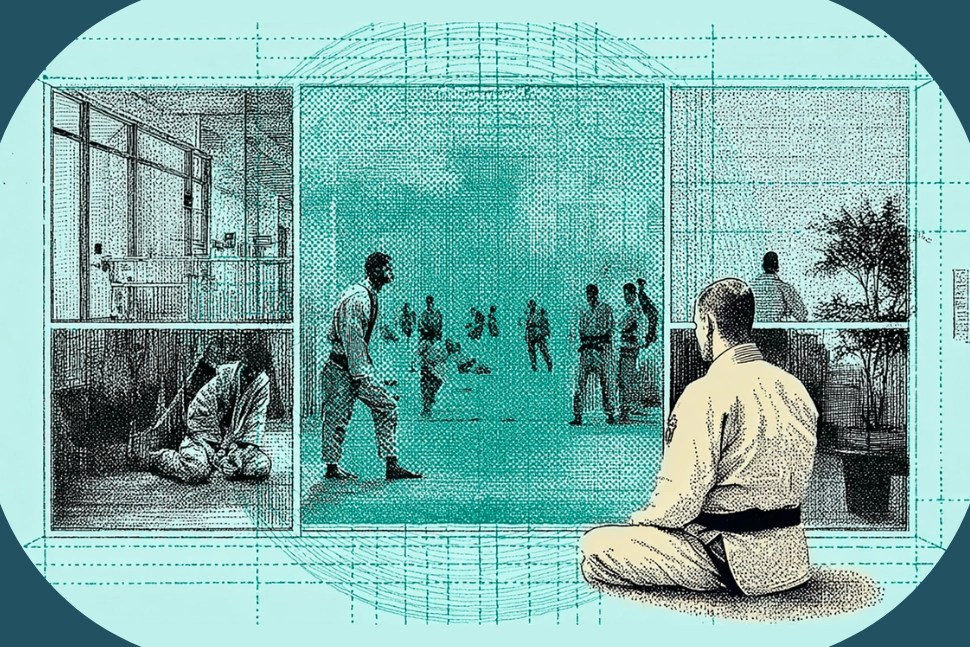AI SEO to Future-Proof Your Jiu Jitsu Academy

How recently did you ask chatGPT a question?
I’m moving, and that means I need to find another place to train. For the first time in decades, I didn’t go to Google search first to look for a new jiu jitsu gym.
I opened Gemini instead and typed “jiu jitsu schools in [my new town].”
For the first time in years, Google’s share of search queries fell below 90% due to the rise of AI chat applications.
Like the sport jiu jitsu meta, search is an ever-changing landscape. AI searches are growing every day.
Jiu jitsu gyms–and martial arts schools in general–have never been especially good at digital marketing as a group…
But if they want to stay in front of potential members, they have no choice but to optimize for AI search applications like chatGPT or Perplexity. And by “they” I mean you.
If you didn’t know already, search engine optimization (SEO) is a process where incremental improvements to websites helps those websites rank higher in search engine results, like Google and Bing. The obvious benefit of this is free traffic and leads for your jiu jitsu school.
AI SEO, or simply AI optimization (AIO), is a process of optimizing website content for how AI understands information through structured data, semantic context, and high-quality, expert content.
AI SEO is also sometimes referred to as Answer Engine Optimization (AEO) and Generative Engine Optimization (GEO), among other names.
If it isn’t clear already, these are the reasons you want to do AI SEO for your jiu jitsu business:
- Another high traffic place to get your brand name visible
- Another (possible) referral source to your jiu jitsu business website (get leads)
- Future-proofing the digital marketing of your academy
So what is the AI SEO process? I demystify and outline it below.
Backlinks & Directory Citations
A backlink, also called a citation, is a link from one website to another, acting as a vote of confidence that can significantly impact search engine rankings.
Large Language Models (LLMs) like chatGPT and Claude AI rely on signals from existing online directories to understand if a business entity is real, relevant, and quality (that is, worth recommending).
These websites also feature genuine opinions and experiences expressed by real users, what is often called user generated content (UGC). Google loves this kind of content, and so do AIs.
Think about it like this:
We as humans rely on referrals and recommendations from trusted friends and family to find a great deal of products and services throughout life. We also look at reviews by other people.
These signals are essential in helping us understand how to decide for or against products and services. LLMs are not much different, and it makes perfect sense why.
Now this is where it gets fascinating:
Many of the largest and most authoritative directories often block LLM agents from crawling, indexing, and using the data on their websites.
This means that brand names like Yelp or Google Business Profiles are not necessarily the directories that will help you get mentioned in an AI answer engine.
To understand where you need to button up your listing and ask students for reviews, get an AI visibility tool and examine the most-cited directory and review websites.
For example, Gymdesk has a solid presence on the most popular and trusted software review websites like Capterra and G2.
But those weren’t the most cited directories used by AI answers to recommend software in our category. Instead, we found a software review site we’d never even heard of was the most cited authority.
AI tools are exorbitantly expensive, but SurferSEO has an affordable AI search visibility tracking tool in addition to its AI-aware content optimization features.
Dedicated AI visibility tools like Peec.AI also have affordable options for small businesses like your jiu jitsu school.
Finally, remember that your jiu jitsu school is a local business serving a small geographical area. Make sure you’re prioritizing a strong presence on local directories, because AI tools will be doing this, too.
The occasional backlink from industry authorities, like Jiu Jitsu Mag, will help establish your school website’s topical authority on jiu jitsu as well. It’s not local, but it does raise your site authority, which is great for traditional SEO just as much as AI SEO.
Schema Markup
I know a combat athlete and gym owner like you doesn’t want to be reading about coding stuff, but I promise this one isn’t too technical.
Schema markup is a type of structured data in the form of HTML or JSON code that you add to your website to help search engines like Google understand your content better. It’s not visible to your web browser, but it’s in the source code and readable to machines.
Historically, this enabled search engines to display enhanced search results, known as rich snippets, providing more information directly on the search results page, such as ratings, prices, or event dates.
In AI SEO, schema markup helps ensure LLMs understand your content. JavaScript on websites creates dynamic experiences for web surfers, but it can obscure the HTML text content to LLM agents trying to ingest the page.
Schema solves this problem by allowing LLMs to grab the text content and skip processing the entire page. It also gives them clues on how to format the content in its answers.
The best schema related to jiu jitsu lessons for AIO right now are
- Organization schema. This tells AI what your company is, what you’re called, what your logo looks like, and where your social profiles live. It reinforces your identity across the web.
- Article schema. Which helps AI parse blog content. It includes the title, date published, author, and main image — all of which give credibility and freshness cues.
- FAQ schema. This is for structured Q&A content. LLMs often use these exact answers when people ask similar questions in their AI chatbots.
- Author schema. This connects a human author to the content on the web page. If you are a known entity, this establishes authority and trust.
You can use several free technical SEO tools to generate schemas for you so you don’t have to slog through the schema.org documentation. Make sure you fill as many fields as possible–the more complete, the more helpful (and potentially credible) it is to LLMs reading your website.
Topical Authority Content (Post About Jiu Jitsu)
Topical authority is a website's perceived expertise and credibility in a specific subject area, built by consistently publishing high-quality, in-depth content that covers a topic from multiple angles.
This was first a Google search phenomenon, but it seems like LLMs rank websites in a similar way too now. In fact, more so than Google, LLMs like to find one authoritative source and reference it across an entire constellation of closely related topics.
So how do you know which topics to cover?
Old fashioned SEO keyword research in a tool like SEMrush or Surfer is the best way to uncover topics to cover on your school’s blog or, in some cases, even on the pages describing your martial arts programs.
Now, a word of caution here. You do need to use the keywords a few times in your articles, but you should not stuff your article full of them. This is spammy, it hasn’t worked since 2012, and nobody wants to read it.
YouTube is one of the most cited sources across LLM answers right now. If you want to develop authority and find more chances to show up in front of AI searchers, create YouTube videos with well-optimized titles and descriptions to act as companions to your blog posts.
Better yet, engage in an old content marketing technique called content reuse. Choose one master format, either video or text, and then reuse the content from that to create content for other mediums.
For example, let’s say you created a good video addressing a grappling topic in-depth. You can then have that video automatically transcribed and then digested into a text-based blog post via a number of affordable AI tools.
From there, you can easily pull out video clips and text and image snippets to post across social media. The audio of the video can easily be fed into podcast RSS feeds with no additional human editing or processing, and so on.
Some advice from a veteran SEO…
I’ve been involved in SEO for over a decade, and the content marketing operation I built at Gymdesk has proven itself to perform well in AI search.
AI SEO is here to stay, but it would be a mistake to optimize purely for AI search and neglect the standard, old school local SEO fundamentals.
Local SEO still drives the lion’s share of organic results for martial arts schools. Search behaviors have changed, and are changing, but Google is adapting, too. ChatGPT might have a significant share of searches now, but Google still monopolizes nearly 90% of the search market.
By comparison, AI search sometimes hallucinates things that aren’t true, and it often does not cite website links to businesses it recommends or writes about. In general, its local search capability is still in development and not a good experience for users.
So, your jiu jitsu academy website, Google Business Profile, Yelp, and other directories, should all be complete, consistent, fully optimized, and actively managed. These will help your AIO, but more importantly, these are still the biggest lead generators for you–for now.
The good news is that AI optimization completely overlaps with standard SEO strategy. A bit of clever planning allows you to optimize for both search engines and AI chats within the same marketing campaign.
Conclusion
The AI SEO, or AIO, process is essential for future-proofing your business by optimizing content for how LLMs ingest information: structured data, semantic context, and expertise.
Here’s your condensed playbook for how to optimize your academy’s website specifically for AI search:
- Get and maintain relevant backlinks and directory citations. LLMs use these citations, along with User Generated Content (UGC), to verify your business's relevance and trustworthiness.
- Implement schema markup. It’s hidden metadata that lets the LLMs skip over your website’s complex JavaScript and quickly grab facts. Key schemas for a gym include Organization, Article, FAQ, and Author—the more complete your schema, the more credible your page appears.
- Establish topical authority. This means producing a consistent stream of high-quality, in-depth content that covers your subject, jiu jitsu, from multiple angles.
Finally, don’t abandon local SEO. Google still drives the vast majority of organic traffic, and AI search can be sloppy, often “hallucinating” facts or failing to provide direct links. A smart strategy optimizes for both AIO and traditional SEO simultaneously.
Gym management software that frees up your time and helps you grow.
Simplified billing, enrollment, student management, and marketing features that help you grow your gym or martial arts school.






.webp)